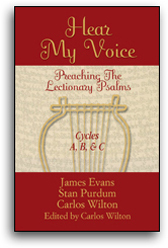SermonStudio
Thanksgiving Day
Preaching
Hear My Voice
Preaching The Lectionary Psalms for Cycles A, B, C
There is perhaps no greater challenge to the life of faith than suffering. There is an implicit expectation that God, who is strong and loving, will protect those who are weak. When tragedy befalls the innocent, it is hard not to wonder about God's strength or goodness, or both.


